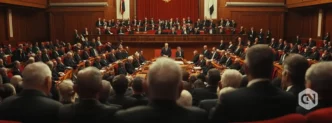It has been clear for quite a while that the global economy has been weakening for the past few months, and there has been a lot of speculation regarding the possible solutions to the impending trouble. The trade war between the United States and China is definitely one of the reasons behind the slowdown, but overall, the global economy seems to have come to a halt. Growth rates in some of the biggest economies in the world have dropped, and it has now emerged that the United States Federal Reserve is all set to cut interest rates in order to recharge the economy. All over the world, Central banks have been cutting interest rates in order to provide the much-needed stimulus to their economies, and it is no surprise that the Federal Reserve is likely to go in the same direction.
According to a survey conducted by Bloomberg with economists, the consensus is that the Jerome Powell led Federal Reserve is going to cut interest rates this week. In this regard, it is important to note that Powell has not been known for being happy with regards to rate cuts. In fact, the United States President Donald Trump has routinely attacked him for not cutting interest rate enough. However, in his defence, Powell did cut the interest rates to 2% to 2.25% back in July, and the latest Bloomberg suggests that he is now set to cut the rates by another 25 basis points this week. That being said, there is also speculation whether Powell is going to go above and beyond the sort of mid-cycle adjustment that most people are accustomed to.
Economists currently believe that the cut is not going to be that drastic. They believe that the rates are going to be cut against later on in 2019 and those rates, believed to be in the 1.5% to 1.75% range, could stay on for a considerable period. In their note, the Bloomberg Economics stated,
Bloomberg Economics expects policymakers to cut rates in steady 25-bp increments until the yield curve is no longer inverted. We believe this means rate cuts in September, October and December.
The economists have usually been on track with regards to such estimates, and it remains to be seen if their estimates prove to be on track this time around.







